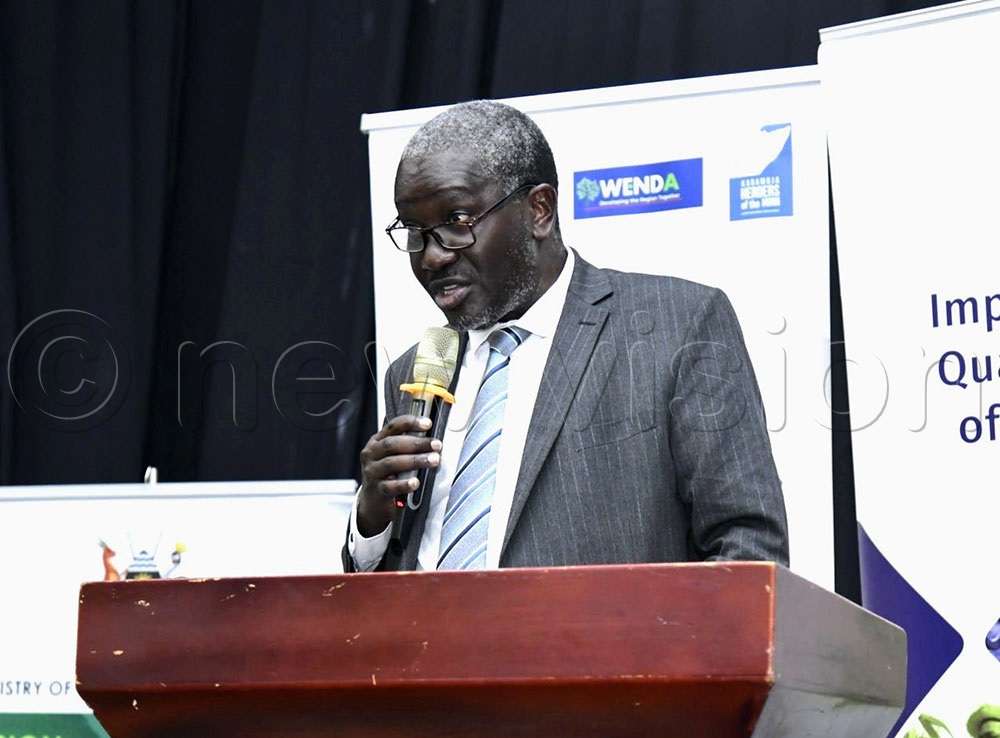CSOs call for fair climate finance, gender-responsive action at COP30
In their joint position paper, which they presented at Uganda’s pre-COP30 National Forum, the CSOs emphasised the need for inclusive, transparent, and accessible funding mechanisms to effectively support vulnerable nations and locally led climate actions.
Onesmus Mugyenyi, the Deputy Executive Director, ACODE, presenting the CSOs joint position paper. (Photo by Jeff Andrew Lule)
________________
Uganda’s Civil society organisations (CSOs) leading climate initiatives have called on global leaders and climate change experts to strengthen climate action, promote gender equality, and ensure equitable access to climate finance at this year’s COP30 climate summit and conference in Belém, Brazil.
In their joint position paper, which they presented at Uganda’s pre-COP30 National Forum, the CSOs emphasised the need for inclusive, transparent, and accessible funding mechanisms to effectively support vulnerable nations and locally led climate actions.
They highlighted the importance of integrating gender considerations into all climate processes and advancing technology transfer to bridge capacity gaps in developing countries.
Onesmus Mugyenyi, Deputy Executive Officer of the Advocates Coalition for Development and Environment (ACODE), stressed that the loss and damage fund must be “fully operationalised, adequately capitalised from both public and private sources, should be grant-base, of course consistent with the agreement, and ensure justice and equity, and be more accessible to vulnerable countries for direct budget support.”
Minsitry of Water and Environment Dr. Alfred Okot Okidi addresing the forum. (Photo by Jeff Andrew Lule)
He added that the funds should support non-state actors and enable locally led initiatives.
The CSOs also urged COP30 to adopt an ambitious gender action plan to address inequality within climate policies.
“We call upon COP30 to consider and adopt an ambitious gender action plan fit for advancing gender equality and addressing gender injustice in the context of climate action,” Mugyenyi said.
The pre-COP30 National Forum was organised by the Ministry of Water and Environment at Silver Springs Hotel in Bugolobi, a Kampala suburb.
The COP30 began with a two-day leaders’ summit, which started on November 6, 2025. The conference is scheduled to run from November 8, 2025, with various side-line events, until November 21, 2026.
This year’s climate conference marks three decades since global climate negotiations began.
While countries have managed to slow the projected rise in emissions, scientists warn that this remains insufficient to prevent extreme warming in the coming decades.
The CSOs highlighted the need for technology transfer and capacity building, emphasising that COP30 negotiations should aim to bridge technological gaps, enabling developing countries to implement effective climate solutions.
They also called on the Ugandan government to promote green jobs, adopt digital climate monitoring tools, and support domestic technology development to reduce reliance on imported solutions.
On mitigation, they called for increased grant-based financing for a just energy transition.
“We normally talk about phasing down fossil fuels, but while scaling up sustainable interventions in the utilisation of renewable options,” Mugyenyi said.
They further called for the operationalisation of the global goal on adaptation, backed by predictable and equitable finance mechanisms, and called on developed nations to honour commitments under the polluter-pays principle.
They also stressed the importance of integrating health into global climate frameworks, ensuring that health considerations are explicitly recognised and financed under the United Nations Framework Convention on Climate Change (UNFCCC) mechanisms.
They handed over their joint position paper to Dr Alfred Okot Okidi, the Permanent Secretary of the Ministry of Water and Environment.
The ministry welcomed the advocacy, noting that the country’s COP30 strategy aims to translate commitments into tangible economic and diplomatic partnerships.
“This will enable Uganda to advance toward its $500 billion economy target through investments in agro-processing, tourism, manufacturing, minerals, oil and gas, and technology transfer,” Okidi noted.
The ministry also revealed that the Green Climate Fund has already approved $31 million (Sh108b) in result-based payments to Uganda for measurable progress in reducing deforestation and greenhouse gas emissions.
Okidi noted that the funding would support reforestation initiatives to restore the country’s degraded forest cover, which, according to the National Forest Authority (NFA), increased from 9% in 2015 to 13.4% in 2023 following programs such as REDD+, Forest Landscape Restoration, community-based management, and private-sector tree planting.
Persistent challenges, however, remain, including population pressure, land tenure conflicts, illegal logging, and limited enforcement resources.